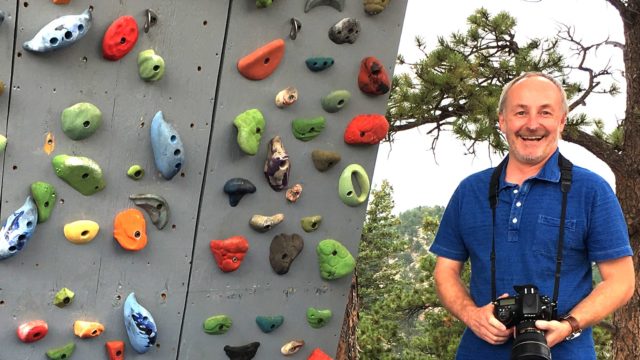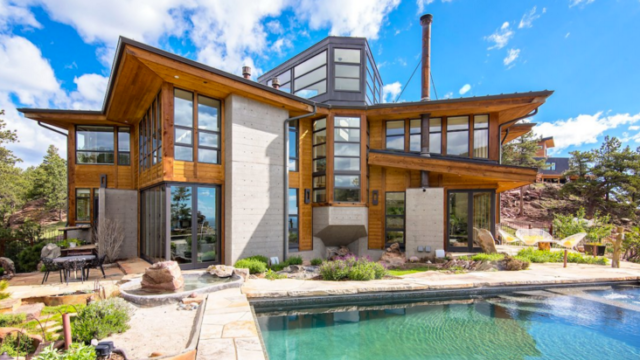You may have visited Boulder’s new multidimensional Rosetta Hall. If so, you no doubt recognized the unique experience it offers, unlike another in Boulder, and perhaps anywhere else.
With its doors first thrown open in early October, the gleaming otherworldly European-style food hall and lounge at 1109 Walnut Street has eight restaurants, two bars and a coffee shop. It turns into a dance hall on Friday and Saturday night, until 1 a.m. — likely the only dance club in town where you’ll find many attendees over 30 years old.
The traditional front-of-house, back-of-house restaurant division does not exist at Rosetta; the exposed food stations showcase chefs working on center stage. They combine with the light, people, food, sound and, of course, taste to dance the mind into a strange euphoria.
This experience comes from a careful attention to detail and a vision for Rosetta Hall as an immersive theater from Rosetta’s local owners — the same group that owns the Boulder Theater, Rembrandt Yard and the Fox Theater led by Doug Greene, his wife Tiffany Mitchum and son Donovan, with Ron Levin and Don Strasburg.
The vision kickstarted in 2015 when the group purchased the 6,829-square-foot space and had an idea to transform the perennial divey college dance club into an upscale food hall.
The vision leveraged the deep entertainment and food industry experience of the Greenes and other partners to produce a unique business by giving talented food artisans a space to showcase their work, says Donovan, a filmmaker who serves as Rosetta Hall’s CEO.

Donovan Greene, Rosetta Hall co-owner and CEO. Source: Rosetta Hall.
To research the concept, Rosetta partners traveled the world, visiting food halls in Madrid and Barcelona and Amsterdam including LA’s Grand Central Market and those in New Orleans and New York City.
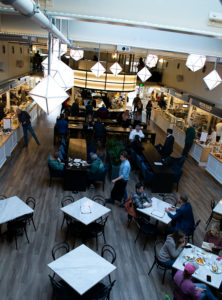
The layout
Boxcar welcomes patrons as they enter the foyer; the coffee bar transforms into a wraparound bar as visitors proceed into the hall’s bowels. (There’s also a rooftop bar and lounge area with an oyster bar!)
The eight restaurants bracket Rosetta’s high-ceilinged central hall and function, in some ways, as performance art. Diners see each full kitchen and the dance chefs perform in creating their food. They’re working, you’re watching; then you take your Cassoulet to eat at one of the open tables.
The space mixes an undeniable old-school Hollywood magic with the clinical, modern feel of its marble, white and rich blue aesthetic. That compelling conflict spins visitors around in a fun house dizzy, and then spits them back onto Walnut. Emerging from Rosetta feels like exiting a portal from another dimension of full sensory overload.
A set of geometric light fixtures hang from the ceiling, containing high-tech bulbs (connected to a software system) that change color and project images, which becomes especially useful on Friday and Saturday nights, when Rosetta workers remove the tables, a DJ perches on the back staircase and the space turns into a dance hall.

One of the two bars in the food hall. Image: Tatyana Sharpton.
Rosetta as restaurant incubator
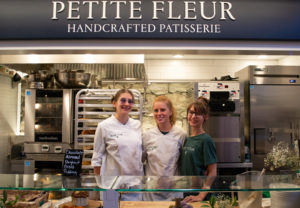
Rosetta Hall provides the platform upon which restaurateurs can build their menus and businesses with a minimal capital outlay.
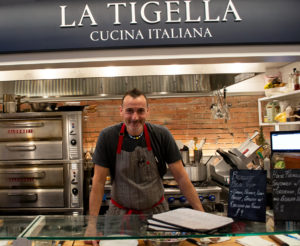
Rosetta Hall covers most of the overhead for the chefs so they can focus on preparing their food. Rosetta provides the space, kitchen equipment, bussers, dishwashers and handles payroll for a 22 percent cut of sales.
“They’re like artists we put on stage,” Donovan says. “It’s the first model like this in the world. The same way that Boulder Theater is a stage we put different performing artists on.”

Restaurateurs do not have to clean the bathrooms, run the bar or market. All they do is cook, something Natascha Hess, who runs the Asian street-food-focused stall The Ginger Pig, appreciates.
“Coming from a food truck, this was an opportunity of a lifetime,” Natascha says.
Running a restaurant alone is a daunting endeavor. Rosetta helps its chef just focus on the food.
“If I went out and raised money for my own restaurant I’d be the only one getting people in there,” Natascha adds. “Here you have six other people bringing guests in!”
The many restaurants in tight proximity leads to a natural cross-pollination of ideas and practices.
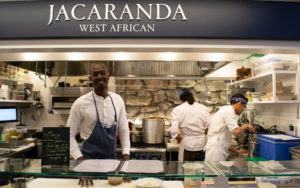
For some chefs, Rosetta presented an opportunity to open their own restaurant. Modou Jaiteh, a native of Gambia and chef at Jacaranda, which proffers West African dishes such as peanut butter lamb stew and black-eyed pea fried rice, worked at Lyons coffee shop The Stone Cup when a contact gave Donovan his info. Donovan reached out and Modou jumped at the opportunity to open his own shop where he could just focus on his craft.
He appreciates the diversity of food Rosetta presents patrons. “It’s more than just food,” Modou says. “Taking a historical angle, it’s the conversations about connection and similarities … like Africa, the American south, South America. These places all have things in common.”
Additional reporting by Tatyana Sharpton.
Header image: Chef Dustin Brandt and chef de partie, Shane Relkin, of Confit prep cauliflower for their Cauliflower Gratin. Image: Tatyana Sharpton


